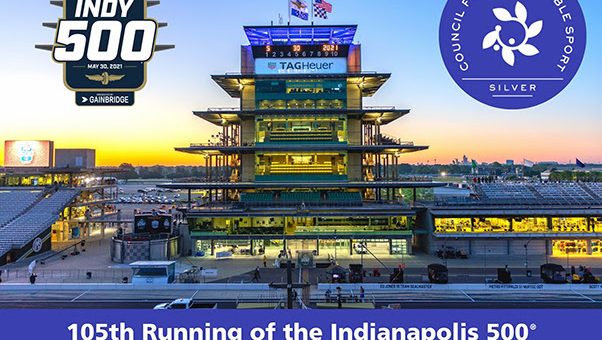INDIANAPOLIS — The Indianapolis 500 presented by Gainbridge, the largest single-day sporting event in the world, is now a certified responsible event by the Council for Responsible Sport. This is the first time a motorsports event has achieved the distinction and marks a key milestone for one of sports’ most iconic events.
The Council for Responsible Sport is a 510(c)(3) non-profit with a vision of a world where responsibly produced sports events are the norm. It has been helping people measure, manage and verify the social and environmental impacts of their events since 2007.
Indianapolis Motor Speedway also announced today the venue will become among the earliest adopters of the newly released responsible sport standard that applies to the year-round activities of sport hosting organizations and venues. In addition to the Indy 500 and the GMR Grand Prix in May, this new standard of operation at IMS will include the three races of the NASCAR/INDYCAR Brickyard Weekend – the Big Machine Spiked Coolers Grand Prix, the Pennzoil 150 at the Brickyard and the Verizon 200 at the Brickyard.
The achievement of silver-level responsible sport certification of the 2021 Indianapolis 500 was awarded to IMS and Penske Entertainment Corp. by the Council earlier this week after confirming the May 30 race had successfully implemented all mandatory standards and a total of 37 of the social and environmental impact considerations recommended in the Responsible Sport Standards for Events.
“This is an impressive first-time certification level and clearly shows the dedication of IMS, Penske Entertainment Corp. and their partners to building an increasingly sustainable approach for their famed event,” said Shelley Villalobos, managing director, Council for Responsible Sport.
Responsible Sport Certification provides a structured approach for event hosts and organizers to measure, implement, validate and improve the social and environmental sustainability of their events and is earned by taking actions spanning five categories: planning and communications, procurement, resource management, access and equity, and community legacy.
“This is an important milestone for the Indianapolis Motor Speedway as we work toward our goal of becoming carbon negative,” IMS President J. Douglas Boles said. “As the world’s largest single-day sporting event, we know we have an opportunity to be a leader in encouraging other major events to strive toward sustainability and positive social impact. We are grateful that the Council for Responsible Sport has helped provide us with a road map to accomplish this important task and mission, which aligns with the goals and values of IMS and Penske Entertainment.”
Credit toward the silver certification was achieved in all five categories and was guided by a social and environmental responsibility plan for the event that coordinated activities between departments and supporting partners, Shell and Waste Management among them, and will serve as a blueprint for future performance improvement against set criteria.
Elements of the plan ranged widely; from venue upgrades completed this spring that increase the efficiency of energy and water use on site, such as LED lighting, water-conserving faucet retrofits and paper-free hand dryers in all public restrooms, to growing the “Bike to the 500” event, which gathers spectators to cycle – rather than drive – to “The Greatest Spectacle in Racing.”
The social responsibility initiatives earning credit included physical accessibility services for spectators, serving as a COVID-19 vaccination site and the ongoing partnership with NXG Youth Motorsports Inc.
Additional credit toward the recognition was earned by waste prevention efforts such as donating 2,562 unserved meals to Second Helpings for redistribution and donating used banners to People for Urban Progress, which makes them into products such as messenger bags.
In another first for the event, a greenhouse gas emissions (GHG) inventory completed in collaboration with Waste Management Sustainability Services provides a baseline for the development of new approaches alongside partners around on-site energy and fuel use, team travel and spectator travel, which for most sporting events is the largest source of event-related GHG emissions. All the electricity used at the venue on race weekend was carbon-neutral through the purchase of Green-e® Certified Renewable Electricity.
